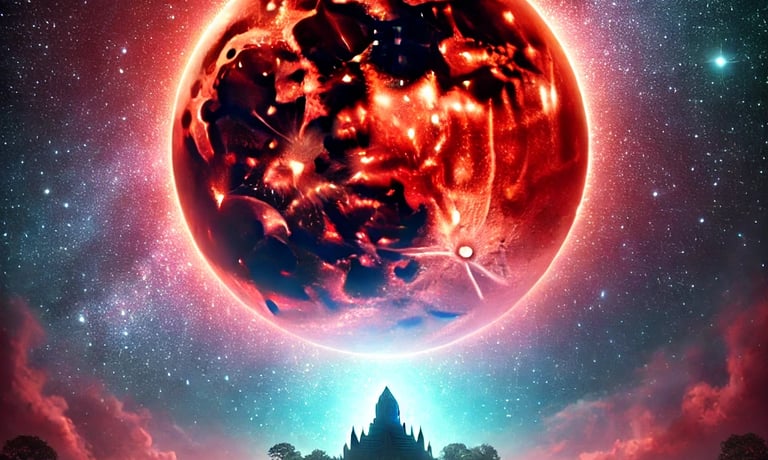Understanding the Blood Moon: Science and Impact
DREAM LIFE VISION
By Sia Imime
3/13/20253 min read


Disclosure: This article contains affiliate links, meaning that if you purchase through them, I may earn a small commission at no extra cost to you. I only recommend products that I believe will add value to your personal growth journey.
The Fascination with the Blood Moon
The Blood Moon, a total lunar eclipse where the moon takes on a reddish hue, has been a source of intrigue and speculation for centuries. While some cultures view it as a celestial omen, modern science reveals that this astronomical event has measurable effects on human biology, psychology, and even global events. In this article, we will explore the scientific studies behind the Blood Moon and its potential influence on human behavior, health, and historical occurrences.
1. The Science Behind the Blood Moon
A Blood Moon occurs when the Earth comes directly between the Sun and the Moon, casting a shadow that filters sunlight through the Earth's atmosphere. The red color is due to Rayleigh scattering, the same phenomenon responsible for red sunsets. Scientists have studied how lunar cycles, including eclipses, impact human and animal behavior, leading to fascinating discoveries.
2. Biological and Psychological Effects on Humans
Disruptions in Sleep Patterns
Studies have shown that full moons and lunar eclipses can affect sleep quality. Research from the University of Basel found that during full moons, participants took longer to fall asleep, had reduced deep sleep, and experienced shorter sleep durations.
Increased Emotional Sensitivity
The moon’s phases, particularly eclipses, have been linked to heightened emotional responses. A study published in the journal Psychiatry Research found an increase in hospital admissions for mood disorders during full moons.
Hormonal Changes and Menstrual Cycles
There is evidence that lunar cycles may synchronize with the human menstrual cycle. A study from the American Journal of Obstetrics and Gynecology suggests that some women experience cycle shifts in response to lunar phases.
3. Impact on World Events and Human Behavior
Historical Events Coinciding with Blood Moons
Some researchers have correlated major global events with lunar eclipses. For example, the 2014-2015 "Tetrad" Blood Moon series coincided with political upheavals and economic shifts. While correlation is not causation, many historians and astronomers have noted patterns in wars, revolutions, and natural disasters occurring near these celestial events.
Increased Crime and Unusual Behavior
The "Lunar Effect" hypothesis suggests that full moons and lunar eclipses influence crime rates. A study by the Journal of Criminal Psychology reported a spike in violent crimes during full moon periods, with some law enforcement agencies historically increasing patrols during these times.
4. The Blood Moon’s Influence on Nature
Animal Behavior Shifts
Nocturnal animals that rely on moonlight for hunting or navigation exhibit changes in activity levels during a Blood Moon. A study published in Frontiers in Ecology and Evolution found that predators like lions and wolves alter their hunting patterns during lunar eclipses.
Tidal and Atmospheric Changes
Although the moon’s gravitational pull affects tides daily, some researchers suggest that lunar eclipses might contribute to subtle shifts in atmospheric pressure, potentially influencing weather patterns.
5. The Spiritual and Cultural Significance
Many cultures have long believed that Blood Moons signify transformation, upheaval, or divine messages. Ancient civilizations, including the Babylonians and Mayans, documented lunar eclipses as signs of impending change, reinforcing their impact on human psychology.
6. How to Harness the Energy of the Blood Moon for Personal Growth
Since the Blood Moon has been associated with change and transformation, many people use it as a time for reflection, goal-setting, and renewal. Here’s how you can make the most of this celestial event:
1. Engage in Meditation and Mindfulness
Lunar eclipses are a great time for deep introspection. Try meditating under the Blood Moon to gain clarity on your life’s direction and set intentions for the future.
2. Journal Your Thoughts and Goals
Write down what you want to release and what you want to welcome into your life. The Blood Moon is often seen as a time to let go of negativity and embrace new opportunities.
3. Connect with Nature
Spending time outdoors during the eclipse can enhance your connection with the universe. Whether it’s stargazing or simply taking a mindful walk, being present in nature can be rejuvenating.
4. Practice Gratitude and Manifestation
Use the heightened energy of the Blood Moon to focus on what you’re grateful for and visualize the life you want to create. Many believe that affirmations and manifestation practices are more powerful during this time.
5. Cleanse Your Space and Energy
Many spiritual traditions encourage clearing negative energy during an eclipse. You can do this by decluttering your home, burning sage, or taking a relaxing bath infused with essential oils.
Conclusion: A Celestial Event with Real-World Effects
While the Blood Moon is a stunning astronomical phenomenon, its influence extends beyond mere visual spectacle. Scientific studies continue to explore its effects on human sleep, emotions, and behavior, while historians examine its correlation with world events. Whether viewed as a cosmic mystery or a subject of scientific inquiry, the Blood Moon remains one of the most captivating celestial events.
Recommended: Explore the science of lunar cycles with Our Moon.
Recommended: Enhance your stargazing experience with Professional Astronomy Binoculars.
Recommended: Set the mood with Moon Phase Wall Art for a celestial ambiance at home.
Tags: blood moon, lunar eclipse, moon and behavior, moon effects on sleep, full moon psychology, lunar cycles and health, blood moon history, spiritual meaning of blood moon, moon and emotions, celestial events
